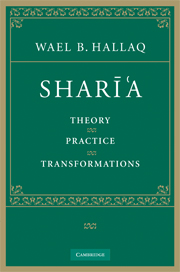Preface and acknowledgments
Published online by Cambridge University Press: 05 June 2012
Summary
Following the collapse of the Soviet Union, Islam has come to fill a pivotal conceptual role of an antithesis to the West, the self-described abode of liberal democracies and the rule of law. With the widespread rise of the Islamist movements during the last three or four decades, so-called Islamic law, or Sharīʿa, has increasingly occupied center stage in the languages and practices of politics – mainly in the Islamist camp itself, but also in the Western world. Popular narratives and a staggering array of quasi-scholarly accounts have distorted Sharīʿa beyond recognition, conflating its principles and practices in the past with its modern, highly politicized, reincarnations. This book is about distinctions; about what Sharīʿa – as doctrine and practice – represented in history; how it functioned within society and the moral community; how it coexisted with the body-politic; and how it was transformed and indeed appropriated as a tool of modernity, wielded above all by the nation-state.
Although this book has, in many ways, been in the making for over two decades, it was written between 2004 and 2008, during which period much in my thinking on the subject continued to change and develop. Over time, this thinking and the resultant book became increasingly grounded in frameworks of enquiry beyond the field of law in general and Islamic law in particular. And like many other books, its several chapters and sections were written under variable conditions.
- Type
- Chapter
- Information
- Sharī'aTheory, Practice, Transformations, pp. vii - xPublisher: Cambridge University PressPrint publication year: 2009



